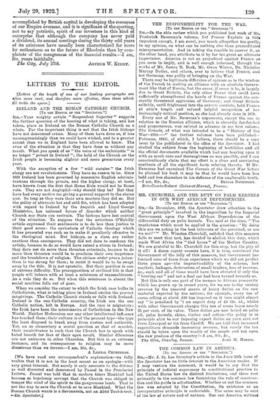LETTERS TO THE EDITOR.
[Letters of the length of one of our leading paragraphs are -often more read, and therefore more effective, than those which fill treble the space.]
BIEL 4 rill) AND THE ROMAN CATHOLIC CHURCH. [To THE EDITOR OF ME " SPECTATOR."] Bia,—Your weighty article " Respondent Superior " suggests the further question of the bearing of what is taking, and has taken, place in Ireland on the Roman Catholic Church as a whole. For the important thing is not that the Irish bishops have not denounced crime. Many of them have done so, if less uncompromisingly than we could have wished, and to a greater extent than we in England have been allowed to know. The crux of the situation is that they have done so without any result. What you speak of as " the voice of the ecclesiastics " is no longer " potent in Ireland "; the hold of the Church on the Irish people is becoming slighter and more precarious every year.
With the exception of a few " wild curates " the Irish clergy are not revolutionists. They have no reason to be. Since 1829 Ireland has been governed by successive English adminis- trations through the priests, and the higher clergy, at least, have known from the first that Home Rule would not be Rome rule. They are not Anglophil—why should they be? But they have had every motive for giving a general support to the status quo. So long as they were their own masters they did so. But the policy of alternate hot and cold fits, which has been adopted with regard to Ireland by the Asquith and Lloyd George Ministries, has unloosed forces of disorder which neither Church nor State can restrain. The bishops have lost control of the situation. To suppose that the notorious O'Rahilly article expressed their sentiments is to do less than justice to their good sense : the caricature of Catholic theology which it has presented was such as to make it peculiarly offensive to the theological mind. But bishops, as a class, are rather cautious than courageous. They did not dare to condemn the article, because to do so would have raised a storm in Ireland; they dare not do more than threaten criminals, because to do more than threaten would be to proclaim their own impotence and the breakdown of religion. The civium ardor prava juben- tium is too strong for them; to resist it would be to be swept away by the tide. It is not apostolic. Bat their position is one of extreme difficulty. The presupposition of civilized life is that people will behave with at least a minimum of reasonableness. As a rule they do so. But when this minimum is absent the social machine falls out of gear.
When we consider the extent to which the Irish race bulks in Catholicism. what is taking place in Ireland excites the gravest misgivings. The Catholic Church stands or falls with Ireland. Ireland is the one Catholic country, the Irish are the one Catholic nation, left in Europe. And the race is migratory; the Irish have been the missionaries of Catholicism in the New World. Neither Modernism nor any other intellectual influence has touched them; their culture is of the peasant type—the type the least disposed to break away from custom and authority. Yet, on so elementary a moral question as that of murder, their recalcitrance is such that the Church has to speak with bated breath for fear of their open revolt. Similar dilemmas are not unknown in other Churches. But this is an extreme instance, and its consequences to religion may be more disastrous than we foresee.—I am, Sir, &c.,
A LIBERAL CHURCHMAN.
[We have read our correspondent's explanation—we fully `realize that it is not in the least meant as an apologia—with very great interest. But surely it only amounts to the defence so well dissected and denounced by Pascal in the Provincial Letters. Pascal was told that in modern times Mankind had become so hopelessly corrupt that the Church was obliged to temper the wind of the spirit to the gangrenous lamb. That is not the way to save the Church or to save Mankind. What the lioman Church wants is a Savonarola, not an Abb6 Tout-h-tout. r—En. Spectator.]


































 Previous page
Previous page